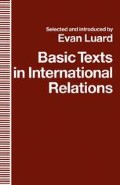Abstract
But while many observers of international relations in the nineteenth century saw war as a legitimate instrument of state policy — for promoting national interests or winning national independence, for acquiring colonies or for freeing colonies — by the end of the century there was also increasing recognition of its heavy cost, both in blood and treasure. Were the wars which the nationalist writers demanded likely to prove worthwhile? The view came to be expressed by some that their costs outweighed any gains that could conceivably be won. Modern armaments were increasingly complex and expensive. Casualty figures in recent wars had become heavier and heavier. No advantage that could be gained from any future war, it was widely asserted, could conceivably match the price that would have to be paid.
Access this chapter
Tax calculation will be finalised at checkout
Purchases are for personal use only
Preview
Unable to display preview. Download preview PDF.
Copyright information
© 1992 the estate of Evan Luard
About this chapter
Cite this chapter
Luard, E. (1992). The State’s Search for Peace. In: Basic Texts in International Relations. Palgrave Macmillan, London. https://doi.org/10.1007/978-1-349-22107-3_21
Download citation
DOI: https://doi.org/10.1007/978-1-349-22107-3_21
Publisher Name: Palgrave Macmillan, London
Print ISBN: 978-0-333-51665-2
Online ISBN: 978-1-349-22107-3
eBook Packages: Palgrave Political & Intern. Studies CollectionPolitical Science and International Studies (R0)

